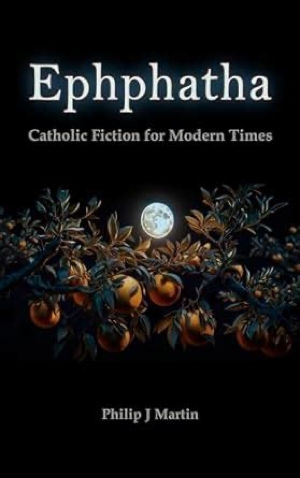“Ephphatha: Catholic Fiction for Modern Times” by Philip J. Martin. Full Quiver Publishing. (Pakenham, 2024). 213 pp., $14.99.
In the fourth short story of his “Ephphatha” collection, “The One Thing Necessary,” Philip Martin regales the reader with the story of a sibling relationship at odds: A surly older brother, forced to accompany his younger sister to the concert of a famous country-rock idol, simmers with resentment — that is, until a disenchanting encounter with the star himself leads to an unexpected reconciliation between the siblings. In his tale, Martin provides a striking description of the fictional musician, which in the best tradition of Catholic fiction is both intensely symbolic yet plausibly deniable:
 “Nick was not as put together or handsome as he appeared on television. He stumbled to the bar and poured a drink. (…) His arms and chest were as golden as his hair, which was as golden as the drink he finished off before setting the cup before them on a coffee table.”
“Nick was not as put together or handsome as he appeared on television. He stumbled to the bar and poured a drink. (…) His arms and chest were as golden as his hair, which was as golden as the drink he finished off before setting the cup before them on a coffee table.”
Indeed, golden calves of all sorts abound in “Ephphatha: Catholic Fiction for Modern Times.” Popularity, money and pride — among many others — all prove themselves unworthy gods, leading characters astray with their luster into consequences ranging from youthful folly to tragic disaster. In some stories the characters are let off easy, released by sudden mercy from their servitude to their small gods; in others, the cost of their sacrificial offerings is high. In “The Laying on of Hands,” for example, a father’s idolization of a particularly toxic perversion of masculinity puts his own children at risk, and in “Memento Mori” a professor’s desperation to be taken (or take himself) seriously ultimately costs him more than just his marriage.
What is equally interesting, however, is how often the stories in “Ephphatha” don’t stop at merely making light of modernity’s false gods but rather use the shattering of these idols as an opportunity for real grace to break through. This is more common in the collection’s comical stories — one might call them divinely comical — where the characters’ tendencies to make fools of themselves become the setups for a much kinder joke than the reader might have expected. Particularly outstanding in this category are the stories of “The Grove” and “Talitha Koum”; in both cases, an undeserved act of mercy leavened with humor allows some truly self-centered people to grow beyond themselves.
The collection is not perfect; there are one or two cases where a lack of subtlety in the metaphor ruins its impact — the witch in “Apathy,” for example, representing technology’s addictive hold over the minds of the youth, feels a bit heavy-handed. Likewise, the appearance of the literal hand of God in “Tohu wa Bohu” is frankly jarring in its execution. In the rest of his stories, however, Martin’s talent truly shines; the characters are both compelling and alive, and their struggles — whether urgent or petty — are used by the author to distinguish between real relationships, virtues and priorities, and their false equivalents. In the end, both “Ephphatha’s” wry skewering of false idols and its moving scenes of mercy and forgiveness point the reader toward “the one thing necessary”: the one true God, and the only one worthy of our worship.
Reichert is publications administrative coordinator at The Catholic Spirit. She can be reached at reichertm@archspm.org.




